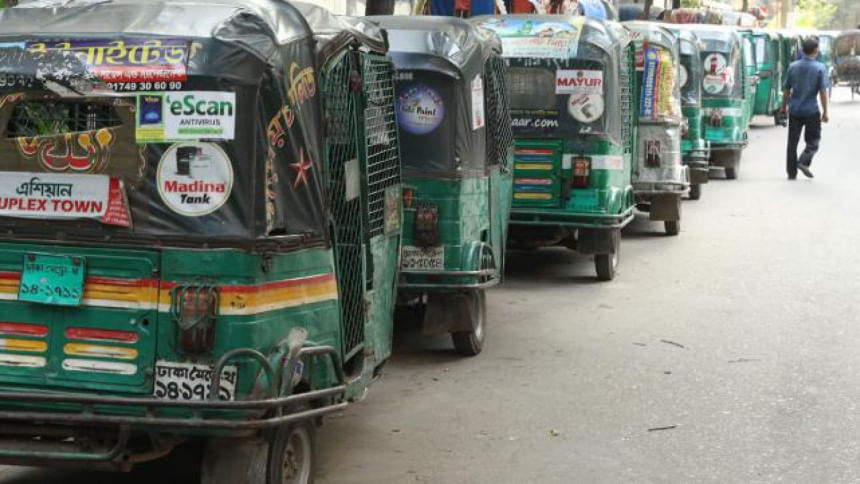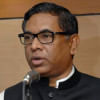3-wheelers to have more fuel options

The government has made a move to amend the four-stroke three-wheeler service guideline to allow the vehicles to use any gas.
Under the existing guideline, four-stroke three-wheelers can either be run on compressed natural gas (CNG) or on petrol.
Bangladesh Road Transport Authority (BRTA) last month wrote to the Road Transport and Bridges Ministry seeking an amendment to the “CNG/Petrol-run four-stroke three-wheeler Service Guideline-2007”.
The move comes at a time when the consumption of LPG is rising fast in the country amid depleting reserves of natural gas. If the amendment is approved, the three-wheelers will be able to use liquefied petroleum gas (LPG).
Energy experts, however, said although the proposed amendment would give more options to consumers, it wouldn't be of any benefit to them in terms of price as both CNG and LPG would cost them almost the same.
LPG is prepared by refining petroleum or “wet” natural gas.
A ministry committee tasked with making recommendations on the proposed amendment gave an opinion in favour of the proposal last week.
“We have submitted recommendations to the ministry secretary. Once the minister gives consent, the amendment would be done,” said Manindra Kishore Majumder, joint secretary of the ministry.
The process of amending the guideline was underway, Manindra, also a member of the committee, told this newspaper on April 17.
The initiative is already facing opposition from Dhaka Auto-rickshaw Sramik Union. It has written to the road transport and bridges minister and the ministry secretary expressing concern that auto-rickshaw owners and drivers will face financial losses if the guideline is amended without having enough LPG refuelling stations.
The BRTA put the proposal to the ministry to facilitate some specific companies who want to sell their LPG-run auto-rickshaws, the union alleged.
The state agency on March 22 sent the proposal so that all other gases, apart from CNG, can be used in four-stroke three-wheelers.
The ministry formed a three-member committee, led by Additional Secretary Abdul Malek. The committee on April 5 held a meeting with the stakeholders, including the owners and importers of three-wheelers.
Citing opinions of some meeting participants, the committee in its report to the ministry said several LPG refuelling stations have already been set up in the country and the number has been going up.
The committee recommended the “CNG/Petrol-run four-stroke three-wheeler Service Guideline” be renamed “Gas/Petrol-run four-stroke three-wheeler Service Guideline”.
Kamrul Ahsan, another joint secretary of the road transport and bridges ministry, said many alternative fuels have entered the market since the formulation of the guideline in 2007.
“In the meeting, most of the participants gave opinions in favour of the proposal. So we gave opinion that the guideline should be changed to enable customers to use fuel as per choice,” Kamrul, also a member of the committee, said.
Sarder Mohammad Sobahan, president of Dhaka Auto-rickshaw Sramik Union, said if the amendment is accepted, drivers will face problems as there are not enough LGP refuelling stations.
“As a result, we will face gas crisis and ultimately incur financial loss,” he added.
The union on March 27 wrote to the minister and the secretary and organised a press conference on April 1 to oppose the BRTA's move.
Nuruddin Jahangir, deputy general manager of Uttara Motors, an importer of CNG-run auto-rickshaw, opposed the proposal in the April 5 meeting.
He said there were only 15 to 16 LPG refuelling stations across the country and problems could arise if the guideline was changed.
The LPG is costlier than CNG and if the CNG- and LPG-run three-wheelers operate at the same time, there will be chaos over fares, he argued.
Joint Secretary Kamrul Ahsan said the committee did not give any opinion on fares. Once the guideline is amended and the LPG and LNG are used, the government will take a decision on fares, he added.
According to Jahangir, CNG-run auto-rickshaws now operating across the country won't be able to use any other fuel.
Refuting his claim, BRTA spokesperson Mahbub-e-Rabbani said the engine of a CNG-run three-wheeler need not to be changed for using other gases.
“We proposed changes due to the availability of alternative fuels. But they [vehicle importers] are opposing the proposal to protect their business interests,” Rabbani, also the BRTA director for road safety, said.
Energy expert M Tamim said if the imported LNG is processed to CNG, both the gases would be regarded as imported product.
“If both the products [CNG and LPG] hit the market at actual commercial prices, people will have an option to choose,” said Tamim, also the head of the petroleum and mineral resources engineering department at Bangladesh University of Engineering and Technology (Buet).
He said the price of CNG, processed from imported LNG and LPG, will be almost the same and people will not get any economic benefit even if the guideline is amended.
Liquefied natural gas (LNG) is natural gas converted into liquid form for ease and safety of non-pressurised storage or transport. The first shipment of LNG arrived in Bangladesh on Tuesday.
Prof M Shamsul Alam, energy adviser of the Consumers Association of Bangladesh, said the government was going to amend the guideline to give benefit to LPG business.
He said the government was not cutting the price of LNG from Tk 50 per unit (per thousand cubic feet); rather it was planning to hike CNG price from Tk 40 to Tk 48 per unit to raise its price to the level of LPG to encourage consumers to use the latter more.
“As a result, consumers will not benefit from the proposed change,” he said.
A BRTA official said around 210,000 three-wheelers have been registered with the organisation since the country's independence in 1971. Of them, 13,000 CNG-run three-wheelers have been permitted to operate in the capital and as many in Chittagong city.
The organisation has no statistics about the total number of registered four-stroke three-wheelers.

 For all latest news, follow The Daily Star's Google News channel.
For all latest news, follow The Daily Star's Google News channel. 








Comments